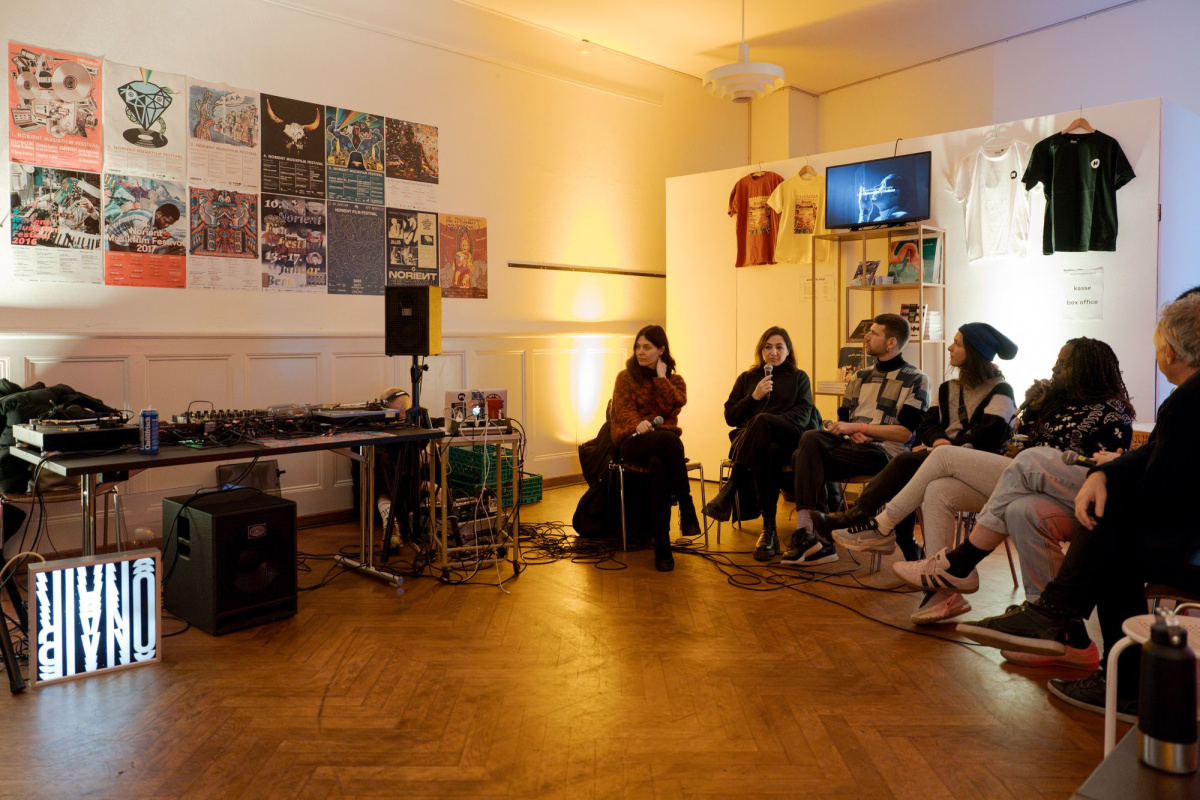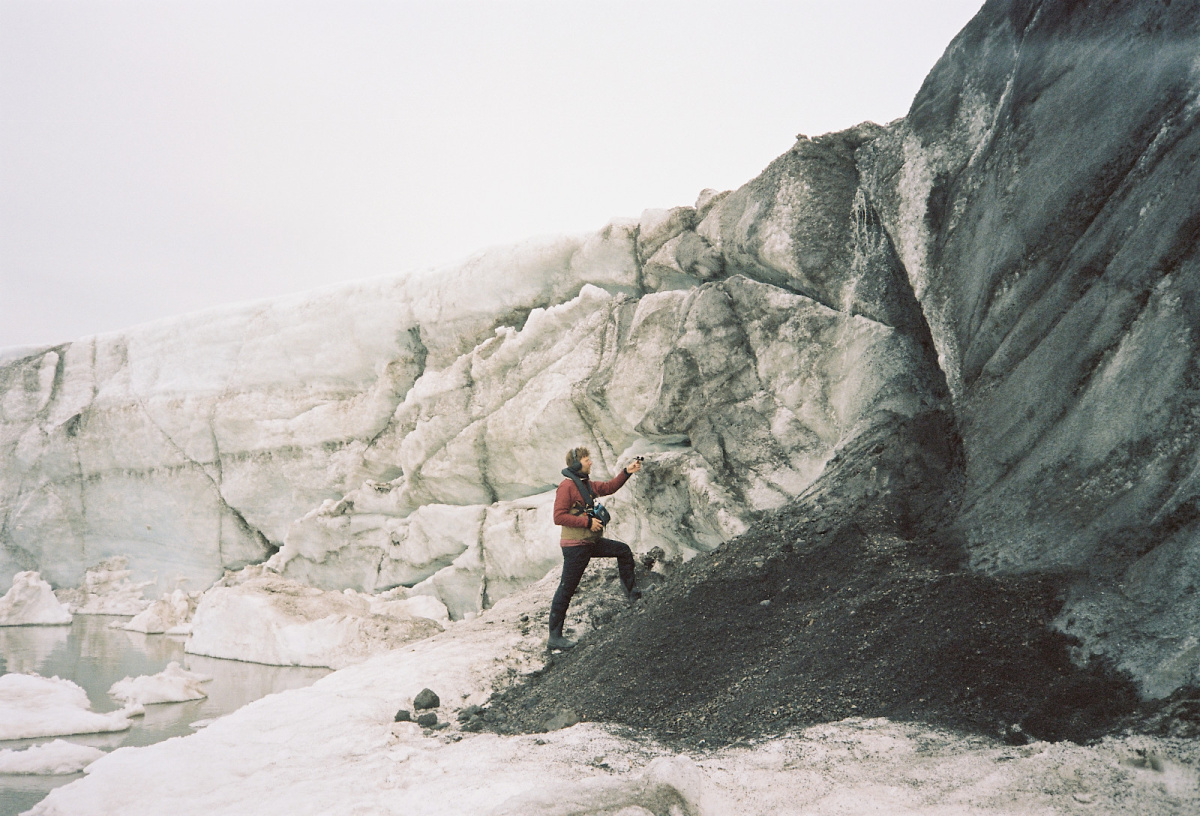
Norient: From Tastemaking to Multimodal Storytelling (Part 2)
What role and methods can a privileged Western person adopt when curating contemporary music from a global perspective? In his ongoing endeavor to understand the world through music and sound, Norient founder Thomas Burkhalter suggests 13 curatorial principles. Read principles 7–13 below and 1–6 here.
7. Help to Decentralize Power
Since 2021, one of Norient’s biggest steps has been not only to work with contributors, but to invite them to curate or co-curate our events. Principle 7 is to decentralize power and authority. It is about letting in more eyes and ears to offer new perspectives: for too long, gatekeepers in international projects have been predominantly from the West, and male. We have pursued this path with the Timezones podcast series (2020, ongoing), the publication Sonic Traces: From Italy (Fusaro 2021), and the Norient City Sounds series (Kariuki and Njue 2022, Badran 2022), which have been curated by people from Africa, Asia, and Europe who are outside our core team.
A further step is being taken through the Norient Festival (formerly Norient Film Festival). Founded in 2010 by Michael Spahr (video artist and co-director of editions 1–4) and myself, the festival aims to present deep stories, research, and thought from across the globe through captivating, experimental, and sometimes challenging films, AV performances, concerts, DJ sets, video lectures, and other digital formats. The festival has often sold out, and led to satellite festivals in Lausanne and St. Gallen, film presentations in various cities in Europe, and a digital COVID-19 edition in 2021 that reached 4,000 people worldwide. After the 10th edition, I decided to hand over the curatorial direction and decision-making to an international and multidisciplinary group of people who are, since 2022, the artistic directors and new faces of the festival. The group works internationally from various cities in India, Lebanon, the United Kingdom, Germany, Kenya, Colombia, and Switzerland.
With ethnography, at its core, still being a colonial approach, we must keep thinking and reflecting on how to rewire power relations.
III POLITICS
8. Pay for Research and Creative Work
Principle 8 seems clear: creative work should be paid. This, however, is less and less the case. Internet radio stations and music magazines (even big ones) often make use of freelancers’ work for free. The question is: is that exploitation? Or is it voluntary work, as in an association, without which the world would be a poorer place?
That creative work and research has little monetary value can be seen almost everywhere. Streaming platforms like Spotify offer artists reach but minimal pay, and universities ask young scholars to lecture for free. An Italian PhD student and colleague was even asked to pay a fee to teach a seminar. It was an investment in his CV, the argument went.
With Norient, we try to pay according to our means. We raise fees when we earn more. We pay better than most of the established Swiss newspapers do today – which to me is kind of shocking. In the early 2000s, the feuilleton of the Swiss daily Neue Zürcher Zeitung would pay me 1,500 Swiss Francs for one page; today, it is around 400.
9. Endorse and Open Doors
Principle 9 is about endorsing artists. At its best, Norient has been able to recognize artists and trends early, and it has helped to open doors many times. For example, Egyptian artist Mahmoud Refat started recording the sounds of Cairo on his mini discs in the early 2000s. In a journalistic feature, I wrote: «With his recordings of the everyday sounds of Egypt, he presents his homeland unfiltered, unadorned – differently.» (Burkhalter 2003). Today, Refat owns the label and music studio 100Copies. He produces artists working in the popular music style Mahraganat, made by rappers and producers from lower class suburbs. While the Egyptian authorities try to crack down on the genre, mainly because of what authorities consider frivolous lyrics and the use of words like «khomor» (alcohol) and «hashish» (cannabis), Refat sold the catalog of his label to the U.S. music company Reservoir Media, along with UAE-based PopArabia, possibly making a lot of money (Guergues 2022).
There are many other examples. Queer New Orleans rapper and bounce artist Big Freedia performed at Norient Festival 2013 and has since featured on superstar Beyonce’s 2022 single «Break My Soul». Meanwhile, queer South African rapper Dope Saint Jude, who performed her second European show at Norient Festival in Bern in 2017, had her song «You’re Gonna Make It» featured on Netflix’s show Inventing Anna. Gabber Modus Operandi from Indonesia, who directed the film 2021: Malam Berkah for Norient Festival’s 2022 edition, collaborated with Icelandic pop star Björk on her latest studio album Fossora.
There are many similar stories. I include them here to indicate that independent curation and research initiatives that are ahead of trends in the market can build – and themselves have – value. It’s an important argument that can be deployed when politics and the public put pressure on funders to finance initiatives catering to bigger audiences – or when they expect a clear and direct benefit from academic research. Good research and curation can help talented artists progress, build a career, and sometimes change lives.
10. Show How Solidarity when Needed
In 2022, war broke out in Ukraine in full force. At Norient, we used our position to draw attention to solidarity actions via Bandcamp. We wanted to demonstrate support for the artists living in Kyiv, Kharkiv, Odessa, and other places. To show solidarity, whenever needed, is principle 10.
Solidarity seemed important, too, during the wars and crises in Syria and Lebanon. Musicians, artists, and thinkers live in these places, people like you and me. This might be a political core of my curation and research. The name Norient was meant as a play on Edward Said’s Orientalism (1978), in which the author uses a continental interdisciplinary approach to trace the relationship between the act of writing, cultural politics, language, and power. He argues that Western writers and journalism have participated in the construction of a hostile image of Eastern cultures as inferior and degenerate. Norient stands for «no Orientalism» and it seeks to look at diversity and cultural practices from up close, rather than through presupposed differences. The name was further inspired by the UK Indian and Pakistani musicians I met at the end of the 1990s, who complained about and made fun of the stereotypes with which they were constantly confronted (Burkhalter 2000). I learned a lot from them, for which I’m deeply thankful to this day. My English was bad back then and I was an unknown, very young journalist. But they welcomed me openly and were generous with their time. (See Burkhalter 2000 and the film Buy More Incense).
We are gatekeepers and advocates. I believe in what Lawrence Grossberg (2010) calls the position of a «political intellectual». In his book, Cultural Studies in the Future Tense, he offers a vision of contemporary cultural studies that embraces complexity, rigorous interdisciplinary practice, and experimental collaboration. He argues that it matters what we say and do as intellectuals «because bad stories make bad politics» (Grossberg 2010, 290). Tim Ingold proposes that it is about learning from others, and gaining insights into other perspectives, experiences, narratives, and motivations for «getting under the skin of the world» (Ingold 2018, 118).
11. Find New Approaches to Identity Politics
Principle 11 is one of the most challenging tasks ahead: to take seriously and move forward from the claims of identity politics. A new generation, many of them millennials, call upon us to wake up, criticizing musicians, writers, scholars, and other creatives for cultural appropriation – and sometimes trying to forbid and «cancel» their works, as, for example, Caroline Fourest shows in her book Génération Offensée (2020). One of the main arguments is that writers are allowed to write about phenomena from their own «culture» only – or, for instance, that musicians from Switzerland cannot play Jamaican reggae.
Although I do not agree with this argument, I agree that other claims made by this movement are important. I believe that in Europe (or in Switzerland, to argue from my own position), we never got a grip on how we relate to people, groups, and cultures from the so-called Global South. We fought important battles at home for women and LGBTQIA+ rights and social welfare. However, we took less seriously the questions of Swiss money in the colonial past and postcolonial present. And, we mostly looked at the non-West through differences. This was, in fact, another reason why I founded Norient in 2002. Norient was meant as an attack on world music. I was critical of Swiss bands wearing African fabrics and playing African music with their djembe and kora instruments. I felt that they reinforced stereotypes. I left many concerts, at times upset by this, but I would never have dreamed of getting a show canceled. This is what happened in my neighborhood, Lorraine Bern, in 2022 (and in other places too). In a concert two hundred meters from my house, a Swiss Reggae band was asked to leave the stage because some audience members felt uncomfortable with the white male band members’ Rasta hair (Schlapbach 2022). I think this goes too far. I prefer to leave the concert space myself rather than stop a band from playing.
According to the Oxford Dictionary, the term cultural appropriation «describe[s] the taking over of creative or artistic forms, themes, or practices by one cultural group from another. It is in general used to describe Western appropriations of non-Western or non-white forms, and carries connotations of exploitation and dominance» (Drabble, Stringer, and Hahn 2013). The presence of exploitation and dominance is crucial, and explains why attacks on artists and scholars can go too far. Often, artists render homage to another culture when they play music from another culture. That they do so superficially at times makes it legitimate for us to criticize them, but not to cancel them online or throw them off the stage. Attacking books, music, and deep thought on the topic of cultural appropriation, or indeed attacking their authors and «canceling» them online, does not bring the world forward. It risks playing into the hands of right-wing politicians and dictators, and could heavily backfire. It does not help to overcome prejudices « or fight racism. In fact, it risks segregating people.
However, many demands made by advocates of identity politics are legitimate. We need new ways of dealing with today’s world. We need more Black, indigenous, and people of color (BIPOC) in power – in cultural institutions, in the media, and at universities. We need to offer spaces for a multitude of voices and expressions, and give power to aspiring curators, journal- ists, scholars, and artists. This is what we are trying to do with Norient.
IV FORMATS
12. Publish in Fitting Formats
In 2020, we staged the fourth relaunch of the Norient website. We renamed it Norient Space «The Now in Sound», signaling that we want to speak about our contemporary world through music, sound, noise, and silence. Norient became a curated audiovisual gallery aiming to provide space for scholars, researchers, journalists, and artists from many disciplines and backgrounds around the world, both young and established. I strongly believe that dialogue between different generations can be fruitful – and I see it happen rarely. Together, a young scholar (who is close to underground artists) and a professor (who is close to theory and methodology) might create stronger work than either of them could alone. The same applies to collaborations between curators, journalists, and artists.
The Norient Space consists of audiovisual media pieces (we call them snaps, consisting of a sound/music and a design layer that are individually commissioned to different artists world- wide), articles, podcasts, photography, video, film, specials, and columns like Sonic Worlding that encourage contributors from around the globe to think and speculate with and not only about music (Rhensius 2022). We further plan to offer an academic archive for researchers and universities, including master and PhD thesis from students. The content is held together with an index, giving it more the feel of a collage than a classic magazine or journal. This makes it possible to read and listen on topics such war, counterculture, and sampling across different geographies and musical genres. The collage approach helps avoid, to use Clifford’s words, «the portrayal of cultures as organic wholes, or as unified, realistic worlds subject to a continuous explanatory discourse» (Clifford 1981, 563). I am convinced that only a patchwork of perspectives can offer real, deep insights into today’s world.
Publishing our research, thoughts, ideas, creations and our curation in fitting formats is principle 12. What kind of representation will do justice to a certain phenomenon? The aim is to publish in formats that appeal to different senses and remain deep and multilayered. They should open spaces for plurality and multiple imaginations, embracing complexity, chaos, and contradictions.
Since 2020, I have asked myself: «Can interviews be transformed into music? Can interview statements become song lyrics, verses, and choruses?» Under the band name Melodies In My Head, I started collaborating with musicians on tracks that incorporated their interview statements, their music, and sounds from me and Bern-based musician Daniel Jakob. I also experimented with these ideas in Norient’s Timezones podcasts series, the first three episodes and prototypes of which were created by me, Svetlana Maraš from Belgrade, and Suvani Suri and Abhishek Mathur from Delhi. The vision is to bring ethnography, art, and journalism closer together, and tell stories in new ways. It is also a next step in trying to collaborate more closely and fairly with artists from different places. Everyone involved will receive a share of any profit made by the published track.
13. Try to Reach People
These audiovisual stories, podcasts, writings, and curations should not be superficial and flat. They should be inspiring and attractive in order to connect with readers and listeners. Trying to reach people is principle 13. With Norient, we try to spread mixes, podcasts, texts, documentaries, and projects across many channels to reach people of different backgrounds and in different contexts.
I feel part of an international community. With Norient, we campaign for the value of creativity and creation in this world – for music, journalism, and research. We want to support and learn from each other and to tell new stories of our time through in-depth research and strong curated programs.
A Personal Summary
Today, I strive for a balance between my artistic projects, my research, and my role at Norient and Norient Festival. I spend two days a week helping to move Norient forward. The project is a constant struggle that requires me to be active and on my feet. It brings me into contact with the younger generation, and collaborating with younger researchers, curators, and journalists affords me huge potential. The articles, playlists, podcasts, and publications collected, researched, curated, and published by writers from different places offer me and others great and inspiring insights into the contemporary world we are living in.
My goal is to maintain a stable platform on which people can improvise, take risks, and create – a platform where aesthetics, positions, and practices collide or come together. It is a long-term approach. I strongly believe that our contemporary world needs visionary thinkers and artists and strong, independent, nonprofit platforms presenting their work and their thinking to the public. Only together can we defy algorithms and filter bubbles, telling new stories that are heard far and wide.
List of References
Filmography
Burkhalter, Thomas, and Peter Guyer, directors. 2020. Contradict. Recycled TV & Norient. (Link). Accessed September 15, 2022.
Burkhalter, Thomas, and Michael Spahr, directors. 2000. Buy More Incense – British-Asian Musicians in the U.K.. (Link). Accessed September 15, 2022.
Gabber Modus Operandi. 2021. 2021: Malam Berkah. Norient. (Link). Accessed September 15, 2022.
This text has been published in the Norient book Politics of Curatorship: Collective and Affective Interventions, edited by Philipp Rhensius and Monia Acciari (Norient Books 2023).
Shop



Published on January 13, 2025
Last updated on January 15, 2025
Topics
About the ups and downs of cross-cultural creativity: Korean reggae, vaporwave, and the worldwide Hindu Holi festival.
From Beyoncés colonial stagings in mainstream pop to the ethical problems of Western people «documenting» non-Western cultures.
From Bangladeshi electronica to global «black midi» micro scenes.
From art exhibitions to djing to personal Instagram feeds, we look at curation from multiple perspectives.
Musicians need to pay rent and taxes. But their relationship to money is highly ambigious.
How did the internet change the power dynamic in global music? How does Egyptian hip hop attempt to articulate truth to power?
Special
Snap


